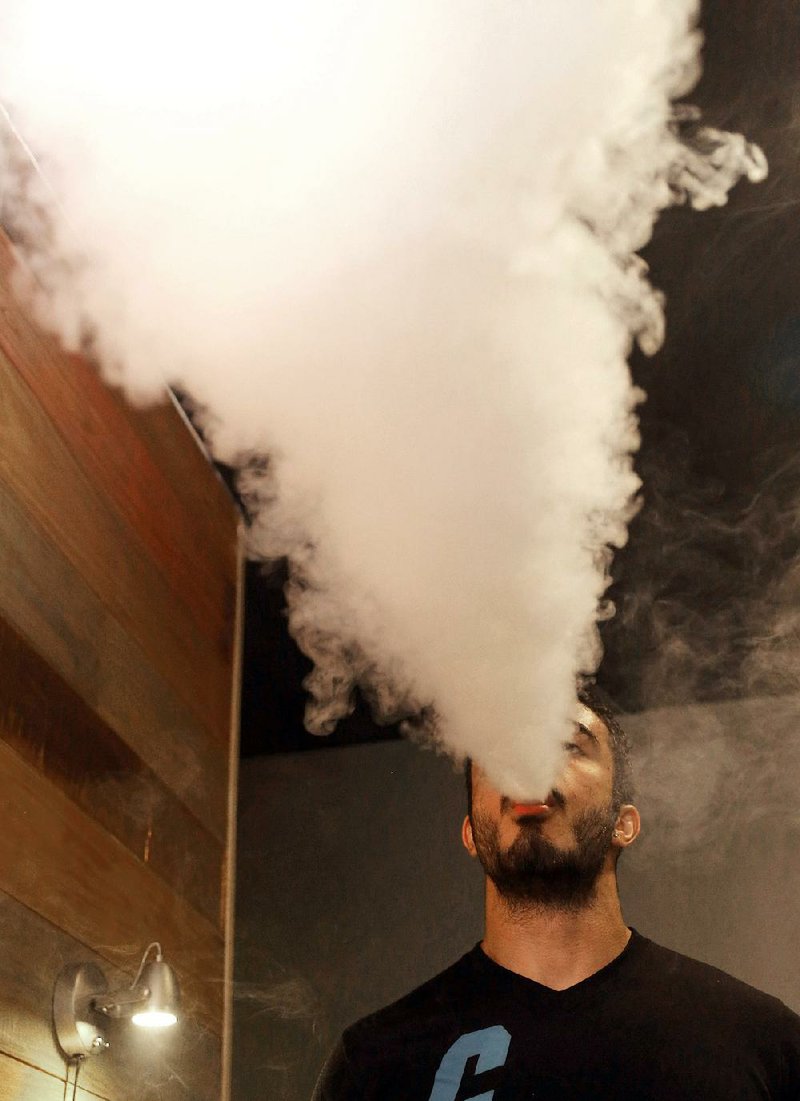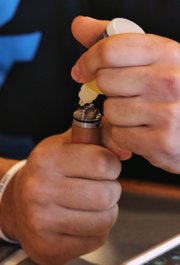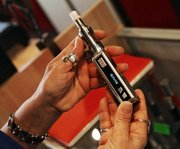At Vapor-Riffic in Conway, things look a little different from when the store first opened in early 2014. Each tiny bottle of the liquid nicotine mixture called e-liquid, used to refill personal vaporizers, now has a childproof cap attached.
And the cartoon-emblazoned labels on those bottles? Those are being phased out.
One thing that hasn't changed are the signs, the ones prohibiting those 18 and under from tasting or buying any of the product.
For more than a year, Vapor-Riffic co-owner Nick LaBanca self-imposed the safety standards at his shop. Now enforcing many of those rules is in the hands of Arkansas Tobacco Control.
As of late July, seven enforcement agents with Arkansas Tobacco Control have more than 100 new stops to make as they check in with vaping and e-cigarette retailers, manufacturers and wholesalers across the state. Regulation of the burgeoning e-cigarette and vaping industries was granted to the office by the General Assembly in April as part of Act 1235. The act amends Arkansas Code to include vapor products, alternate nicotine products and e-liquid products in laws concerning the sale of tobacco products.
But not all e-cigarette products and manufacturers fall under those guidelines, and while the new law grants Arkansas Tobacco Control the power to enforce some safety guidelines for the production of the nicotine mixture used in vaporizers, the agency has yet to finalize those standards.
INCREASED OVERSIGHT
First introduced to the U.S. market in 2007, e-cigarettes are electronic devices that use heat to vaporize a liquid nicotine solution (see graphic). The devices come in two primary forms: closed and open-system.
While closed systems -- typically sold in convenience stores and by larger retailers -- include liquid nicotine in disposable cartridges, open-system e-cigarettes (often called vape pens or vaporizers) are designed to be refilled with a liquid nicotine solution known as e-liquid. E-liquid is typically a blend of propylene glycol, liquid nicotine, flavorings and vegetable glycerin. E-liquid
can be customized to include various levels of nicotine, and some is nicotine-free.
While closed-system e-cigarettes are typically manufactured by large companies, e-liquid is more likely to be mixed in small stores.
The changes in Arkansas Code affect both types of e-cigarettes, including requiring state licenses to sell e-cigarettes, manufacture e-liquid or sell wholesale e-liquid within the state and giving the agency oversight in monitoring e-cigarette sales and vaping products to minors. The licenses, which range from $25 to $500, include specific licenses for wholesale of e-liquid, for manufacturing e-liquid and for retail sale of e-liquid and e-cigarettes.
In addition, anyone selling e-liquid in bulk to retailers in Arkansas must also obtain an Arkansas manufacturing permit or wholesale permit.
Agency director Steve Goode says his team of enforcement agents began visiting e-cigarette retailers and manufacturers in Arkansas before the July permit application deadline to help explain the new licenses.
"Our biggest priority is keeping [these devices] out of the hands of minors," he says.
While the sale of e-cigarettes and e-liquid to minors has been banned in Arkansas since 2013, Goode says there was no rule in place allowing his agency to enforce that law. In addition to monitoring sales of e-cigarettes, he says, enforcement agents will add e-cigarette and vapor retailers to their more than 6,500 annual tobacco retailer inspections.
"Vapor or e-liquid products that are obviously damaged will be removed from the business' inventory," Goode says.
The new vaping laws state that the director of Arkansas Tobacco Control "may adopt safety and hygiene rules for persons that prepare or mix e-liquid products or alternative nicotine products." Among those possible rules: outlining basic safety requirements for e-liquid manufacturers in the state, including requiring a hand-washing station, clean mixing equipment, gloves for employees working with e-liquid and the prohibition of food, drink and animals in the e-liquid mixing area.
While Goode says safety and hygiene inspections will be folded into existing annual inspections, the agency is still working with the state Department of Health to develop "a set of common-sense rules," that may include some of the requirements listed in the law.
Goode says the agency hopes to work with the state Health Department to do laboratory spot-checks on liquid nicotine makers, looking for spoilage and correct nicotine content but, he says, "that will be a ways down the road, after we've gotten all the permits issued and have addressed any necessary rule-making."
Dr. Gary Wheeler, medical director of the Arkansas Department of Health's Tobacco Prevention and Cessation Program, says that while the department has the ability to test liquid nicotine solutions for correct nicotine content or spoilage, funding would first need to be secured for that testing.
"At this point, there are a lot of activities that are unfunded that we may have to develop resources for," Wheeler says. "That may come in from the [licensing fees] ... depending on how much surplus there is, we may be able to begin doing those studies."
Checks will not include closed-system e-cigarettes that are assembled outside the state, which include most varieties sold at convenience and big-box stores.
In the meantime, Wheeler says, the priority is protecting consumers, as well as children and pets that could come in contact with the liquid nicotine solution: "We just got this law, and we'll be working in collaboration with the [Arkansas Tobacco Control] to develop the best practices to protect them."
KNOWN DANGERS
While research on the long-term effects of e-cigarettes and vaping is ongoing, one danger has been demonstrated: liquid nicotine is toxic, especially in highly concentrated solutions.
If ingested or absorbed through the skin in large amounts, the liquid can cause nicotine poisoning or overdose, with symptoms including nausea, dizziness, loss of consciousness or death, according to the National Institutes of Health. All nicotine products, including cigarettes, patches and gum, carry the same hazard, but the liquid nicotine solution used in open-system e-cigarettes poses a unique risk.
"They have an extremely wide variety of potential nicotine content including highly toxic levels," Wheeler says.
Act 1235 requires that all bottles of e-liquid manufactured or sold in Arkansas be fitted with childproof caps. But Wheeler says that more changes, including banning appealing e-liquid "flavors" such as bubble gum and banning cartoons on e-liquid packaging also could help lower the appeal to children.
At Le Cig, a manufacturer in De Queen, e-liquid is produced with nicotine volumes including zero, 6, 12, 18, 24 and 36 milligrams, along with a mix of flavorings, vegetable glycerin and propylene glycol. The more vegetable glycerin in the solution, the more vapor, says owner Michael Elias.
Elias estimates that 7 percent to 10 percent of the e-liquid Le Cig sells contains no nicotine, but the majority sold is the 18 milligram solution, which he says mimics a full-flavor cigarette. In total, Elias estimates Le Cig sells 150 to 175 gallons of e-liquid each month. (See accompanying story.)
Like many e-liquid producers, Elias self-policed before Arkansas laws caught up, including using child safety caps on all of his e-liquid. While Elias says the state licensing process went smoothly, he's looking ahead to the next step: federal regulation.
A HAZY FUTURE
While no federal regulation of e-liquid currently exists, the Food and Drug Administration has been pushing for liquid nicotine to be considered a tobacco product, opening the e-liquid manufacturing world to a host of regulations.
Greg Conley, president of the American Vaping Association, told the Los Angeles Times that potential regulation could wipe out 99 percent of the small vape shops in the nation, while large tobacco companies would have the financial resources to adapt and survive. FDA regulations are expected by the end of the year. (The FDA's explanation of its proposed rule is at tinyurl.com/o8fr3t7.)
"The state permits were affordable, but if the FDA does a big ruling and starts saying we have to put certain additives into [e-liquid] or other regulations that are expensive ... those rules will be geared toward the smaller [vape] shops, and allowing [e-cigarettes] and Big Tobacco to reign," Elias says.
But while Elias and other Arkansas vape-shop owners hold their breath for the FDA ruling, Wheeler says those owners haven't earned his sympathy. "Be careful about being overly compassionate about these entrepreneurs," Wheeler says. "[If they're selling nicotine], they're participating in the drug addiction business."
ActiveStyle on 09/14/2015





